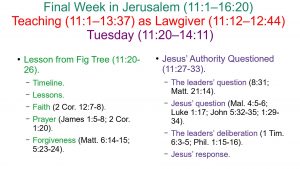Jesus’ Final Week in Jerusalem
Mark 11:1–16:20
Teaching (11:1–13:37)
King (11:1-11)
Sunday: Triumphal Entry (11:1-11).
Lawgiver (11:12–12:44)
Monday (11:12-19).
Tuesday (11:20–14:11).
Lesson from Fig Tree (11:20-26).
 Jesus’ Authority Questioned (11:27-33).
Jesus’ Authority Questioned (11:27-33).The leaders’ question.
If someone had randomly come up and started flipping some tables devoid of any context, I might be wondering where this guy got off, too.
That’s basically what the chiefs priests, scribes, and elders are asking Jesus: “Who gives you the right to do this?”
And they were upset about the table-flipping—keep in mind, they were likely benefiting from the merchandising and thievery taking place.
Granted, this was the day after Jesus did this, but they were shocked and were trying to find the best way to react. Not to mention, they had to inform everyone and gather them together to confront Jesus.
They confront Him publicly in the temple the moment He walks in, likely a little after 6 A.M.
But the thing is, Jesus didn’t do this devoid of any context.
Recall, Matthew records that He is performing miracles right there in the temple, healing the blind and lame (Matt. 21:14).
So Jesus clearly had authority to do these things, yet these leaders wanted more.
Recall also, these are the same leaders that Jesus predicts will reject and kill Him (8:31).
They are not truly interested in finding out who He is, as we’ll find out with Jesus’ brilliant question.
Jesus’ question.
Jesus is not trying to avoid answering this question as some might assume.
He is pointing these leaders to the forerunner, John the Baptist.
This question is specifically concerning John’s baptism, but is a stand-in for all of John’s ministry.
And if they answer this question correctly, then they will have their answer as to where Jesus gets His authority.
We can learn from Jesus here. We do not always have to answer questions outright, but find another question that will better get to the truth of the matter.
As Jesus often went to the Scriptures first to answer other people, here He goes to the man sent from God, predicted to come in the Scriptures (e.g. Mal. 4:5-6; Luke 1:17).
In John’s gospel account, He cited a five-fold witness of who He was, and mentioned John as being part of that witness (John 5:32-35; 1:29-34).
Jesus’ questioning suggests a reluctance to answer on the part of the leaders, and we see why in the next couple of verses—they were in a Catch-22.
The leaders’ deliberation.
As we noted, Jesus placed them in a Catch-22, having brilliantly disarmed these men—though their hatred and envy continued.
See, they were only in this Catch-22 because they were dishonest men, wanting rather to have power and wealth than to serve the Lord.
People often hate “organized religion” because they feel it is a means for men to gain power and wealth—a grift, if you will.
And sadly, for many, that’s true—it is quite obvious among certain denominations and megachurches (1 Tim. 6:3-5; Phil. 1:15-16).
And it’s true for these men as well, using their positions for personal gain, recognizing that Jesus would upend their apple cart along with the tables He flipped the previous day.
So they deliberate among themselves. They can’t answer one way or another.
Note the choices are not many, but two. Our authority can only come from one of two places: from heaven (that is God), or from men.
If they answer “from heaven,” then they have their answer as to where Jesus’ authority comes from since John testified that Jesus was the Messiah from God.
They also wisely reason among themselves that if they answered “from heaven,” then Jesus would ask why they didn’t believe him.
But I wonder, how would Jesus know whether or not they listened to John?
Jesus wasn’t there for all of John’s ministry.
It is true that some of His disciples were originally John’s and they were likely with John and would have seen them come, but there’s still room for doubt.
On the other hand, news about so many big-wigs in Jewish society being baptized by John would have likely reached far and wide.
Or maybe they simply weren’t following John’s teachings very well.
In any event, it would have been obvious to Jesus, and so they assumed He would know somehow that they didn’t listen to John.
But then, if they answered “from men,” they were afraid of the people.
The thing about people in power is… they are always in the small minority.
Their power is only given them because the people recognize their power and authority.
If for some reason they no longer recognized it, there isn’t much those in power could do, so they feared the people.
Amazingly, the average citizens believed John to be a prophet, despite having performed no miracles, He was still seen as having come from God.
If the leaders rejected this for some reason, they would be seen as rejecting God, a far greater power than whatever these leaders wielded.
Obviously they did not believe John, but they were too cowardly to admit it.
So they answer is cowardly, “We do not know.”
Jesus’ response.
Since these leaders cannot be bothered to answer Jesus’ question honestly, Jesus feels He is under no obligation to answer them outright.
But the thing is, He already has answered them by the miracles He has performed.
Miracles are meant to confirm the words or actions of a prophet.
While Mark doesn’t record that He performed any here, Matthew sure does.
Of course, this does not negate the 18 other specific miracles Mark records, or the dozens He performed that weren’t specifically mentioned.
He certainly has Divine authority, but the leaders were too blinded by their own hubris to see it.
This is something Jesus makes plain in the fifth and last parable recorded by Mark.
